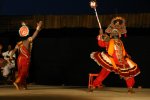The Tamil Nadu Kattaikkuttu Kalai Valarchi Munnetra Sangam is a grassroots organization that promotes the cultural and economic rights of professional Kattaikkuttu performers. It was established in 1990 by a group of seventeen performers belonging to different Kattaikkuttu theatre companies. At present the Sangam has more than two hundred members who live in the northern districts of Tamil Nadu and the Chittoor district of Andhra Pradesh. The Kattaikkuttu Sangam runs the Kattaikkuttu Youth Theatre School, which provides professional Kattaikkuttu training to underprivileged, rural children in combination with basic education. The Sangam provides a framework within which performers can discuss their professional demands and aspirations. It produces new plays, organizes theatre and other creative workshops, in addition to an annual Kattaikkuttu Festival.
The Kattaikkuttu Sangam is the organizer of the Kuttu Festival 2005 through which it wants to celebrate, together with other performers and its regular audiences, the fact that the organization exists fifteen years. For this special occasion a group of thirty-five performers who act in the nine different Kattaikkuttu performances put up by the Sangam, in addition to co-organizing the event. They special performance group represents actors and musicians drawn from two important Kattaikkuttu styles, that from around Kanchipuram-Cheyyar and that found in the Gingee-Vilupuram area.
1 hour The Kuttu Festival 2005, and the cycle of Mahabharata performances, will conclude with The Eighteenth Day (Patinettam nal). The play shows Duryodhana, the sole survivor of the eighteen-day long strife on the side of the Kauravas, on the last day of the Paratam war. Overseeing the terrible consequences of the fraternal conflict—his ninety-nine brothers dead, his loyal friend Karna and his preceptor Drona killed, the once beautiful women of Hastinapura widowed, considered a criminal by many, Duryodhana reflects on his motivations to go to war.
Alone on the battlefield of Kurukshetra Duryodhana's moods swing between desperation, lament, fury, fear, heroism and the onset of a degree of demonic craziness foreboding his violent death in battle at the hands of Bhima. Robbed of his close allies, Karna and Sakuni, he asks the only other survivor, the Kattiyakkaran or clown, for advice promising to elevate him to the position of minister the next day when he will have conquered the Pandavas. The Kattiyakkaran tells him that there is little use regretting his actions: Did he ever listen to the advice of his elders? He goes on to belittle Duryodhana's royal position and persona and advises him that he should get down on his knees and hide among the corpses that litter Kurukshetra. In that manner Bhima, who has sworn to kill him on this eighteenth day, will not be able to find him easily. Unable to bear the humiliation Duryodhana regains something of his old posture when he remembers that he possesses the Sanjivi spell through which the dead can be brought back to live. Deciding to recall and use this magic formula he invokes the help of the Goddess of the battlefield. Foreseeing at the same time his own inevitable death at the hands of Bhimasena, he retreats backwards into the waters of the Samarpancha River to invoke the spell.
Duryodhana is the main character of the Kattaikkuttu repertoire. Neither an all-round villain nor a perfect hero, his deeds are determined by his human character, circumstances and fate, which are not favourably inclined towards him. The Eighteenth Day dwells upon the motivations of leaders to engage their country and their people in war without considering its ultimate consequences—a situation which, unfortunately, has not lost its topicality. Even though the acting out of ritual violence remains one of the essential reasons for putting on Kattaikkuttu performances, The Eighteenth Day is one of the few plays where war is not celebrated as an inevitable or desirable event, and where human motivations and the results of organized violence—loss of life, position and possessions, grief, and separation—are tragically highlighted.
Tamil Nadu Kattaikkuttu Kalai Valarchi Munnetra Sangam & Kattaikkuttu Youth Theatre School |


